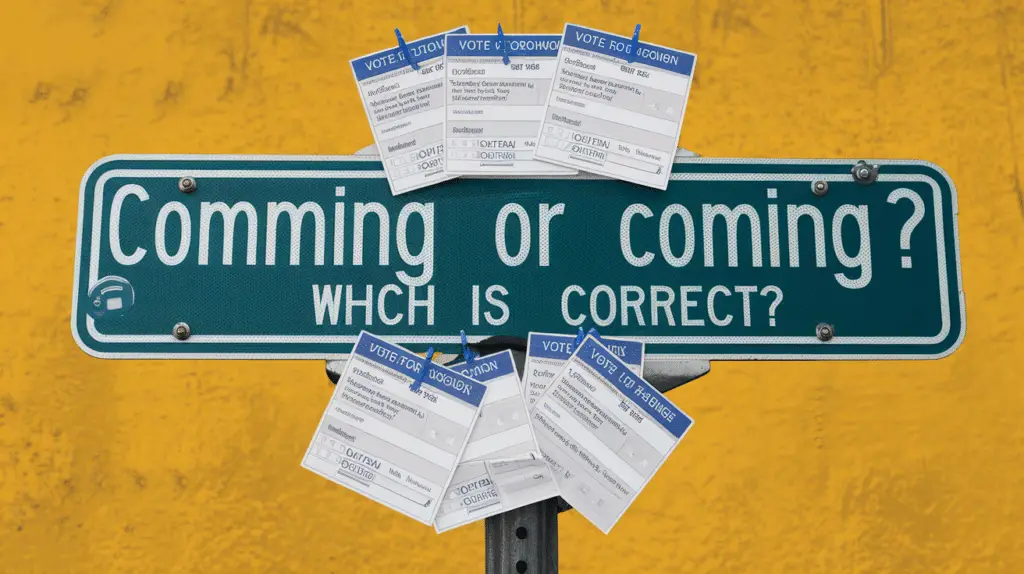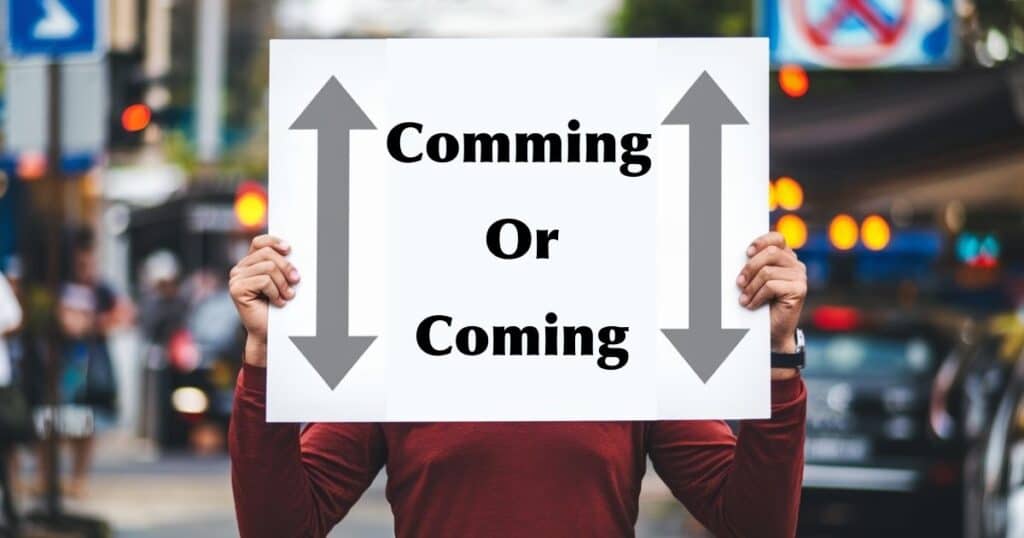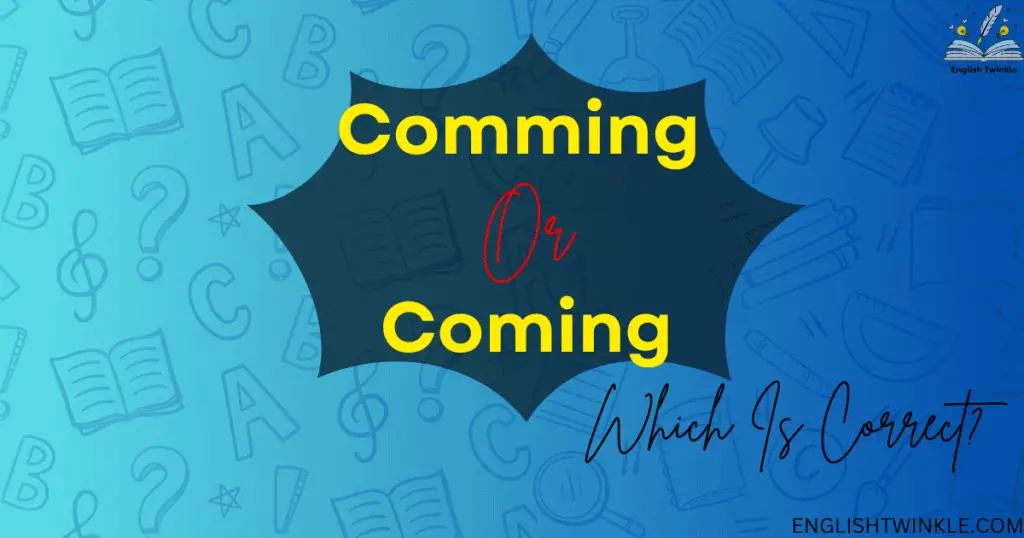Spelling matters. It shapes how people see your writing and impacts communication. One common issue many face is deciding between “comming” and “coming”. At first glance, the words look similar, but only one is correct. Let’s dive into this topic to clear up any spelling confusion. By the end, you’ll know how to use the correct term confidently and avoid this grammar mistake.
The word “coming” follows standard English grammar and spelling conventions. In contrast, “comming” is an incorrect spelling. Understanding the rules behind this difference can help you not only spell this word properly but also apply the same rule to other verbs. This article explores why “coming” is correct, explains its usage in sentences, and even touches on common spelling errors to help you improve your skills.
Why “Coming” Is The Correct Spelling?
The reason lies in English spelling rules. When a verb ends with a silent “e” (like “come”), the “e” is dropped before adding “-ing” to form the present participle form. This is why we write “coming” instead of “comming.” The extra “m” never appears in standard grammar usage.
Consider these examples:
- “Take” becomes “taking.”
- “Make” becomes “making.”
If we doubled the consonant unnecessarily, these words would look awkward and stray from proper grammar standards. By learning this pattern, you can avoid the common errors many make when dealing with words that follow this rule.
What Is Coming In Grammar?
Coming serves as both a present participle and a gerund. In progressive tenses, it describes an action currently happening or ongoing. For example:
- Present Progressive: “She is coming to the party.”
- Past Progressive: “He was coming when the call ended.”
As a gerund, coming can function as a noun, representing the act of arriving or appearing. For example:
- “The coming of winter means colder days.”
This versatility highlights why mastering the proper spelling of “coming” is essential for clear communication in English grammar.
FAQs About Comming Or Coming: Which Is Correct?
Q1: Is “comming” ever a correct spelling?
No, “comming” is never a proper word in the English language. It’s a common typo but does not follow spelling rules.
Q2: How can I remember the correct spelling of “coming”?
One trick is to remember that verbs ending in “e” drop the “e” before adding “-ing.” Applying this grammar rule consistently helps eliminate spelling doubts.
Q3: Does this rule apply to other words?
Yes, many verbs follow this pattern, such as “give” → “giving” and “live” → “living.” However, verbs with a stress on the final syllable, like “begin,” double the consonant, as in “beginning.”
Q4: Are there exceptions to the rule of doubling?
Some verbs do not follow the expected doubling pattern because of stress syllables. For example, “happen” becomes “happening,” but “refer” becomes “referring.”
Q5: Can I use software to check spelling?
Yes, tools like Grammarly or ProWritingAid can help identify and correct misspelled words like “comming.” These tools are excellent for improving overall writing quality.
Is There A Word That Sounds Like “Comming”?
While “comming” is not a word, it can be confused with words like “calming” or the correct spelling, “coming.” Both sound similar but carry entirely different meanings.
- Coming: Refers to approaching or arriving. Example: “The bus is coming.”
- Calming: Describes something that reduces anxiety. Example: “His voice was calming.”
Understanding the context is key to using the correct word.

Can “Coming” Be Used As A Noun?
Yes, “coming” is often used as a noun, especially in literary or poetic contexts. For example:
- “The coming of age is an important milestone.”
In this case, “coming” represents an event or process rather than an action. This dual use demonstrates the importance of understanding grammatical use and proper word form.
What Is The Opposite Of Coming?
The antonym for coming is typically going or leaving. These words describe departure rather than arrival. For instance:
- “The train is going to New York.”
- “She is leaving the room now.”
Knowing opposites can enhance your vocabulary and help you understand word distinctions in various contexts.
Are There Any Other Words That Are Commonly Misspelled?
Yes, English is full of commonly misspelled words. Some examples include:
Here’s the corrected table based on your provided data:
| Incorrect Spelling | Correct Spelling |
|---|---|
| Definately | Definitely |
| Recieve | Receive |
| Seperate | Separate |
Improving your ability to spot and correct these errors can make your writing more polished and professional. Regular practice and tools like ProWritingAid can help with this.
Mastering English Spelling: “Comming” or “Coming”?
The key to avoiding misspelling issues lies in understanding spelling principles. English has many rules, but memorizing them and applying them consistently makes a huge difference. The “drop the ‘e’ and add ‘-ing'” rule simplifies verb conjugation and eliminates spelling ambiguity.
Deciphering the Correct Spelling: “Coming”
Why is “coming” correct while “comming” is not? It all boils down to standard linguistic norms. Writing conventions favor clarity and consistency. Sticking to grammar standards ensures your writing aligns with expectations and avoids errors.
Why Not “Comming”?
Doubling the consonant in “comming” adds unnecessary complexity. Unlike words like “running” or “beginning,” “coming” doesn’t have a stressed final syllable that requires doubling. These writing conventions help standardize English spelling.

AI-Powered Workflows for Ecommerce Companies
In professional settings, especially ecommerce content strategies, using the correct spelling is crucial. Poor grammar or spelling mistakes can harm brand credibility. Tools like AI-powered workflows ensure content is accurate, improving communication and efficiency.
Common Usage in Sentences
Here are examples of coming in sentences:
- “The storm is coming soon.”
- “They are coming to visit us this weekend.”
- “Coming to terms with change is difficult.”
These examples show the versatility of the word in both formal and informal contexts.
Summary and Key Insights
To summarize, “coming” is the correct spelling, while “comming” is a common typo. Learning the rules of continuous tenses and the present participle form can improve your spelling and writing. Regular practice and spelling tools like Grammarly can help eliminate frequent errors and boost confidence in your language skills.
Frequently Asked Questions
How do you spell “coming”?
The correct spelling is coming.
Can spelling mistakes affect my writing?
Yes, incorrect spelling can confuse readers and lower your credibility.
Conclusion
Mastering the difference between “coming” and “comming” requires understanding and applying basic English grammar rules. Whether you’re learning to spell better or aiming for professional-grade writing, tools, and regular practice can make a big difference. Always double-check your work to ensure it reflects the high standards of the English language.
Sources
Here are five key points about the “comming” vs. “coming” debate:
- “Comming” is a misspelling: The correct spelling is “coming,” which is the present participle form of the verb “come.” “Comming” is not a valid word in English.
- Present Participle of “Come”: “Coming” is used in continuous tenses, like the present continuous (e.g., “I am coming soon”), to describe actions that are ongoing or approaching.
- Grammar Rules for Doubling Consonants: In English, the general rule is to double the final consonant only when the word is stressed on the final syllable. “Coming” doesn’t follow this rule, so no doubling occurs.
- Common Misspelling: “Comming” is often mistakenly used because the “g” sound in “coming” is dropped or softened in spoken language, leading to confusion in writing.
- Context and Usage: “Coming” can also act as a noun in certain contexts, like “the coming year,” where it refers to something that is approaching or forthcoming. If you want to Read more.
For more details on spelling rules and common errors, you can visit reliable sources like GrammarBook, Merriam-Webster, and Oxford Dictionaries

